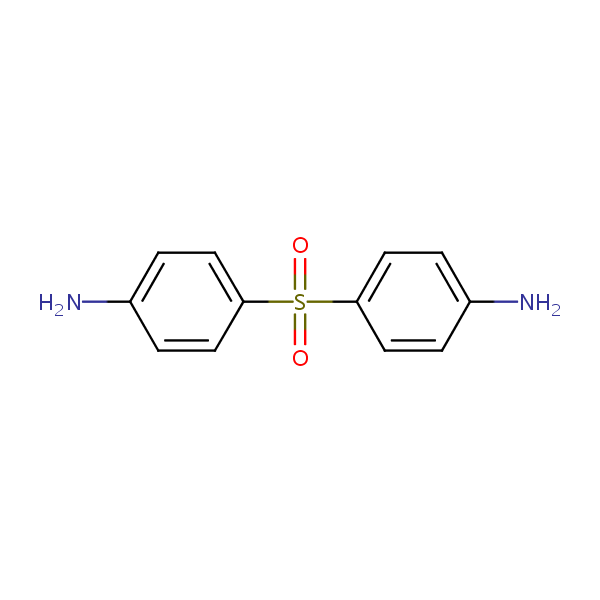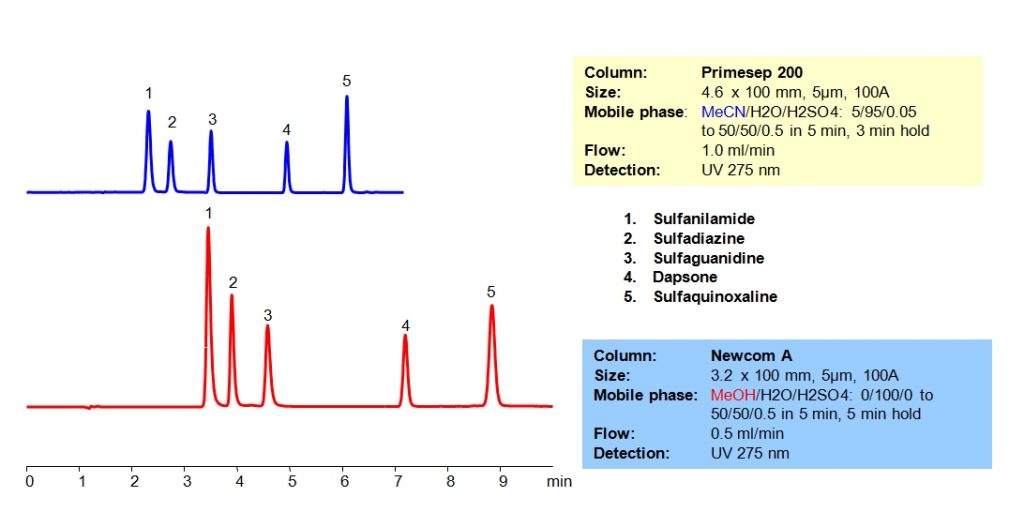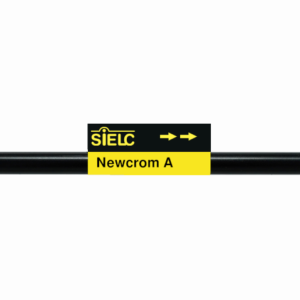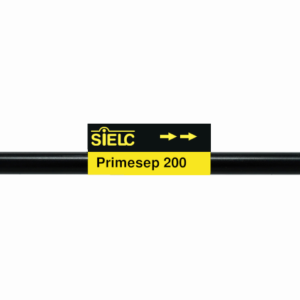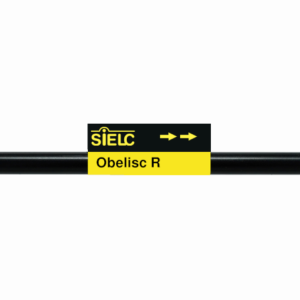| CAS Number | 80-08-0 |
|---|---|
| Molecular Formula | C12H12N2O2S |
| Molecular Weight | 248.301 |
| InChI Key | MQJKPEGWNLWLTK-UHFFFAOYSA-N |
| LogP | 0.97 |
| Synonyms |
|
Applications:
HPLC Separation of Antibiotics on Newcrom A Column
June 11, 2020
HPLC Method for Sulfanilamide, Sulfadiazine, Dapsone, Sulfaguanidine, Sulphaquinoxaline on Newcrom A by SIELC Technologies
High Performance Liquid Chromatography (HPLC) Method for Analysis of Sulfanilamide, Sulfadiazine, Dapsone, Sulfaguanidine, Sulphaquinoxaline.
Antibiotics are widely used for treatment and prevention of bacterial infections.
Sulfanilamide is a sulfonamide antibacterial drug with the chemical formula C6H8N2O2S. It’s height of use was during World War II to treat and prevent the spread of infections among the Allies. Due to later discovery of more effective antibiotics, it is no longer as widely used. You can find detailed UV spectra of Sulfanilamide and information about its various lambda maxima by visiting the following link.
Sulfadiazine is a sulfonamide antibiotic with the chemical formula C10H10N4O2S. It is the treatment of choice for toxoplasmosis and is considered the second-line treatment against numerous other infections. It works by blocking the synthesis of folic acid in bacteria, which prevents cell reproduction. Sulfadiazine can be either taken orally or applied topically. You can find detailed UV spectra of Sulfadiazine and information about its various lambda maxima by visiting the following link.
Sulfaguanidine is a sulfonamide antibiotic with the chemical formula C7H10N4O2S. It is a guanidine derivative of sulfanilamide that works through inhibiting the synthesis of folic acid in bacteria. Most often, it is used to treat Bacillary dysentery.
Dapsone is a sulfone antibiotic with anti-inflammatory properties. As a gel, it is sold under the brand name Aczone as acne treatment, but it can also be used as part of treatment for other skin conditions including leprosy and dermatitis herpetiformis. It’s chemical formula is C12H12N2O2S.
Sulfaquinoxaline is a sulfonamide antibiotic that is typically used in veterinary medicine. It is used to treat Coccidiosis in cattle and sheep, as well as a variety infections in poultry. It is deemed not suitable for human use. It’s chemical formula is C14H12N4O2S.
Various antibiotics, particularly those with a sulfanilamide structure, were separated in HPLC using mixed-mode columns with varying strengths of ion-pairing groups. Methanol can be used in the mobile phase on Newcrom A column. The antibiotics were resolved on both columns with a gradient mobile phase consisting of acetonitrile (ACN) or methanol (MeOH), water and sulfuric acid (H2SO4) buffer. UV detection at 275nm.
| Column | Newcrom A, 3.2 x 100 mm, 5 µm, 100 A, dual ended |
| Mobile Phase | MeOH Gradient |
| Buffer | H2SO4 Gradient |
| Flow Rate | 0.5 ml/min |
| Detection | UV 275 nm |
| Class of Compounds | Drugs, Antibiotics |
| Analyzing Compounds | Sulfanilamide, Sulfadiazine, Dapsone, Sulfaguanidine, Sulphaquinoxaline |
Application Column
Newcrom A
Column Diameter: 3.2 mm
Column Length: 100 mm
Particle Size: 5 µm
Pore Size: 100 A
Column options: dual ended
Sulfadiazine
Sulfaguanidine
Sulfanilamide
Sulphaquinoxaline

HPLC Separation of Antibiotics on Primesep 200 Column
June 6, 2020
HPLC Method for Sulfanilamide, Sulfadiazine, Sulfaguanidine, Dapsone on Primesep 200 by SIELC Technologies
High Performance Liquid Chromatography (HPLC) Method for Analysis of Sulfanilamide, Sulfadiazine, Sulfaguanidine, Dapsone.
Sulfanilamide is a sulfonamide antibacterial drug with the chemical formula C6H8N2O2S. It’s height of use was during World War II to treat and prevent the spread of infections among the Allies. Due to later discovery of more effective antibiotics, it is no longer as widely used. You can find detailed UV spectra of Sulfanilamide and information about its various lambda maxima by visiting the following link.
Sulfadiazine is a sulfonamide antibiotic with the chemical formula C10H10N4O2S. It is the treatment of choice for toxoplasmosis and is considered the second-line treatment against numerous other infections. It works by blocking the synthesis of folic acid in bacteria, which prevents cell reproduction. Sulfadiazine can be either taken orally or applied topically. You can find detailed UV spectra of Sulfadiazine and information about its various lambda maxima by visiting the following link.
Sulfaguanidine is a sulfonamide antibiotic with the chemical formula C7H10N4O2S. It is a guanidine derivative of sulfanilamide that works through inhibiting the synthesis of folic acid in bacteria. Most often, it is used to treat Bacillary dysentery.
Dapsone is a sulfone antibiotic with anti-inflammatory properties. As a gel, it is sold under the brand name Aczone as acne treatment, but it can also be used as part of treatment for other skin conditions including leprosy and dermatitis herpetiformis. It’s chemical formula is C12H12N2O2S.
Sulfaquinoxaline is a sulfonamide antibiotic that is typically used in veterinary medicine. It is used to treat Coccidiosis in cattle and sheep, as well as a variety infections in poultry. It is deemed not suitable for human use. It’s chemical formula is C14H12N4O2S.
Antibiotics are widely used for treatment and prevention of bacterial infections. Various antibiotics, particularly those with a sulfanilamide structure, were separated in HPLC using mixed-mode columns with varying strengths of ion-pairing groups. Primesep 200 has weak acidic ion-exchange pairing groups while Newcrom A has strong acidic ion-exchange groups. In addition, methanol can be used in the mobile phase on Newcrom A column. The antibiotics were resolved on both columns with a gradient mobile phase consisting of acetonitrile (ACN) or methanol (MeOH), water and sulfuric acid (H2SO4) buffer. UV detection at 275nm.
| Column | Primesep 200, 4.6 x 100 mm, 5 µm, 100 A, dual ended |
| Mobile Phase | MeCN Gradient |
| Buffer | H2SO4 – 0.5% |
| Flow Rate | 1.0 ml/min |
| Detection | UV 275 nm |
| Class of Compounds | Drugs, Antibiotics |
| Analyzing Compounds | Sulfanilamide, Sulfadiazine, Sulfaguanidine, Dapsone |
Application Column
Primesep 200
Column Diameter: 4.6 mm
Column Length: 100 mm
Particle Size: 5 µm
Pore Size: 100 A
Column options: dual ended
Sulfadiazine
Sulfaguanidine
Sulfanilamide

Analysis of Antibiotic Dapsone and Related Impurities in Mixed-Mode Chromatography
May 12, 2015
Separation type: Liquid Chromatography Mixed-mode
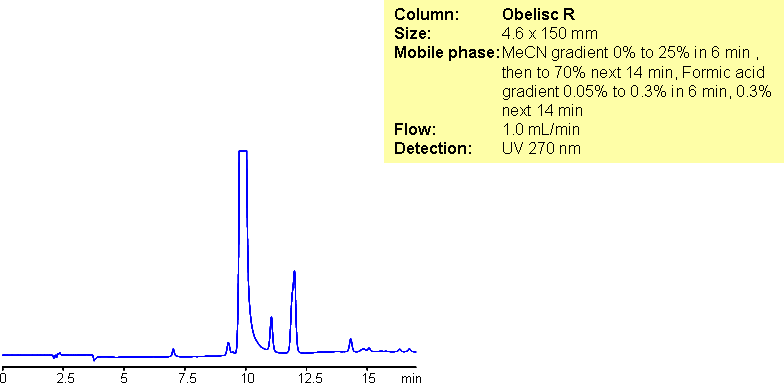
Dapsone is an antibiotic used to treat leprosy and acne. Obelisc R was used to analyze dapsone and its impurities. Obelisc R is a tri-modal reversed-phase, cation- and anion-exchange column. Method is compatible with LC/MS and prep chromatography.
| Column | Obelisc R, 4.6×150 mm, 5 µm, 100A |
| Mobile Phase | Gradient MeCN – 0-25%, 6 min, 25-70% 14 min |
| Buffer | Gradient Formic Acid – 0.05%-0.3%, 10 min, 14 min hold |
| Flow Rate | 1.0 ml/min |
| Detection | UV, 270 nm |
| Class of Compounds |
Insecticide, Herbicide, Fungicide, Hydrophobic, Ionizable |
| Analyzing Compounds | Dapsone |
Application Column
Obelisc R
SIELC has developed the Obelisc™ columns, which are mixed-mode and utilize Liquid Separation Cell technology (LiSC™). These cost-effective columns are the first of their kind to be commercially available and can replace multiple HPLC columns, including reversed-phase (RP), AQ-type reversed-phase, polar-embedded group RP columns, normal-phase, cation-exchange, anion-exchange, ion-exclusion, and HILIC (Hydrophilic Interaction Liquid Chromatography) columns. By controlling just three orthogonal method parameters - buffer concentration, buffer pH, and organic modifier concentration - users can adjust the column properties with pinpoint precision to separate complex mixtures.
Select optionsUV Detection

Separation of Antibiotics in Mixed-mode chromatography
May 11, 2015
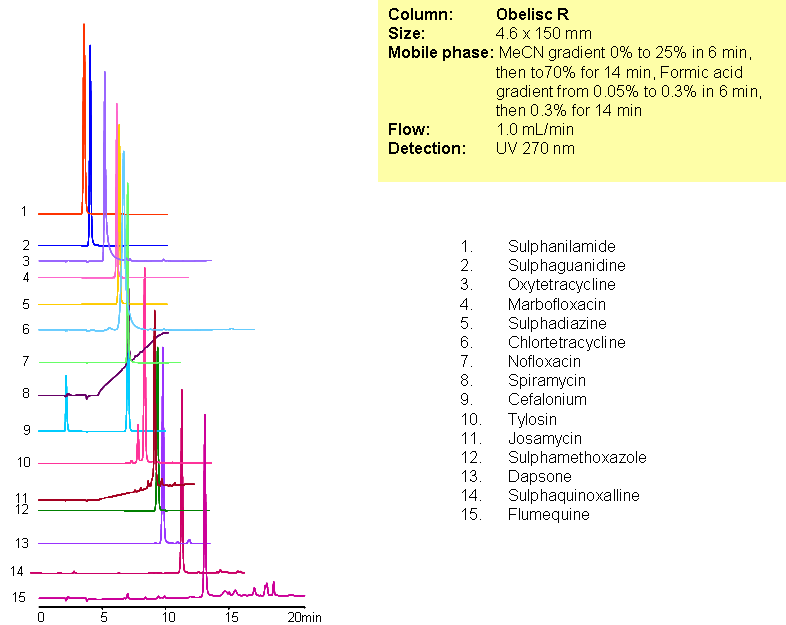
A complex mixture of sulphonamide, macrolide, tetracycline and fluoroquinolone antibiotics were separated in one run using mixed-mode chromatography with LC/MS -compatible conditions. All compounds are separated based on reversed-phase and/or ion-exchange mechanism. Method can be used for analysis of various classes of antibiotics and related impurities in different sample matrices (blood, urine, soil, waste water).
| Column | Obelisc R, 2.1×150 mm, 5 µm, 100A |
| Mobile Phase | Gradient MeCN – 0-25%, 6 min, 25-70% 14 min |
| Buffer | Gradient Formic Acid – 0.05%-0.3%, 10 min, 14 min hold |
| Flow Rate | 1.0 ml/min |
| Detection | UV, 270 nm |
| Class of Compounds |
Antibiotic, Drug, Hydrophobic, Ionizable |
| Analyzing Compounds | Sulphanilamide, Sulphaguanidine, Oxytetracycline, Marbofloxacin, Sulphadiazine, Chlortetracycline, Nofloxacin, Spiramycin, Cefalonium, Tylosin, Josamycin, Sulphamethoxazole, Dapsone, Sulphaquinoxalline, Flumequine |
Application Column
Obelisc R
SIELC has developed the Obelisc™ columns, which are mixed-mode and utilize Liquid Separation Cell technology (LiSC™). These cost-effective columns are the first of their kind to be commercially available and can replace multiple HPLC columns, including reversed-phase (RP), AQ-type reversed-phase, polar-embedded group RP columns, normal-phase, cation-exchange, anion-exchange, ion-exclusion, and HILIC (Hydrophilic Interaction Liquid Chromatography) columns. By controlling just three orthogonal method parameters - buffer concentration, buffer pH, and organic modifier concentration - users can adjust the column properties with pinpoint precision to separate complex mixtures.
Select optionsChlortetracycline
Dapsone
Flumequine
Josamycin
Marbofloxacin
Norfloxacin
Oxytetracycline
Spiramycin
Sulfamethoxazole
Sulfonamides
Sulphadiazine
Sulphaguanidine
Sulphanilamide
Sulphaquinoxaline
Tetracycline
Tylosin
UV Detection

